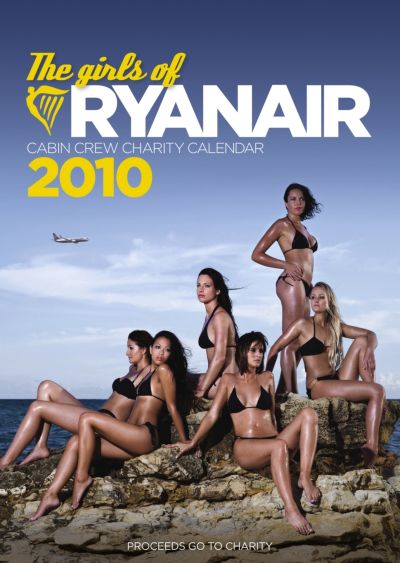16 NOVEMBER 2009
YOUR WORDS
Readers are invited to add their comments to any story. Click on the article to see and add.
BTN DISTRIBUTION
BTN also goes out by email every Sunday night at midnight (UK time). To view this edition click here.
- COMMENT: The British Airways / Iberia Merger
- Air France unveils brand new European service
- Airbus new plane about to fly?
- BAA raises funds
- bmibaby at Manchester
- Boeing Dreamliner to get airborne?
- Business Travel Show gets new name
- Dubai Airshow
- East Coast rail line
- easyJet and Ryanair battle it out
- Emirates and the A380
- Farnborough Airport fails planning
- Heathrow builder moves on
- Hogg Robinson and the EU
- Iberia woes
- Lufthansa and the future of bmi
- Marriott launches new brand
- Southampton gets footbridge
- Stansted a worry
- THAI President visits London
- Turkey's Pegasus expands in the UK
- ON TOUR: World Travel Market
- HAPPY TALK: Prettier than O'Leary
The Business Travel News
PO Box 758
Edgware HA8 4QF
United Kingdom
info@btnews.co.uk
© 2022 Business Travel News Ltd.
Airbus new plane about to fly?
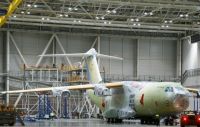 AIRBUS A400M is likely to get airborne before the end of the year. AERBT mentions this as national newspaper editors are likely to flag the event confusing readers even more. The A400M is not a commercial aircraft but a large rear loading military transport built by Airbus and, as seems to be the norm these days, three years late. It is not unlike the Shorts Belfast of the 1960s which was also powered by four turboprop engines. Some 192 have been ordered by various air forces, although significantly South Africa has in recent weeks cancelled its order for eight. Assembly is at the EADS Seville plant. www.airbusmilitary.com
AIRBUS A400M is likely to get airborne before the end of the year. AERBT mentions this as national newspaper editors are likely to flag the event confusing readers even more. The A400M is not a commercial aircraft but a large rear loading military transport built by Airbus and, as seems to be the norm these days, three years late. It is not unlike the Shorts Belfast of the 1960s which was also powered by four turboprop engines. Some 192 have been ordered by various air forces, although significantly South Africa has in recent weeks cancelled its order for eight. Assembly is at the EADS Seville plant. www.airbusmilitary.com
Boeing Dreamliner to get airborne?
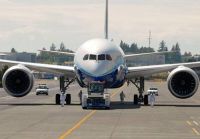 BOEING has moved a step nearer the promised 2009 maiden flight of the 787 Dreamliner with the announcement that the company has completed installing reinforcements within the side-of-body section on the flying prototype. The modification entailed installing new fittings at 34 stringer locations within the joint where the wing is attached to the fuselage. The plan is for the flight-test team to perform another set of gauntlet and taxi tests to ensure that all systems are ready. Once that is completed all that remains is a single high-speed taxi test. The first flight of aircraft number two is likely to follow within days. www.boeing.com/commercial
BOEING has moved a step nearer the promised 2009 maiden flight of the 787 Dreamliner with the announcement that the company has completed installing reinforcements within the side-of-body section on the flying prototype. The modification entailed installing new fittings at 34 stringer locations within the joint where the wing is attached to the fuselage. The plan is for the flight-test team to perform another set of gauntlet and taxi tests to ensure that all systems are ready. Once that is completed all that remains is a single high-speed taxi test. The first flight of aircraft number two is likely to follow within days. www.boeing.com/commercial
East Coast rail line
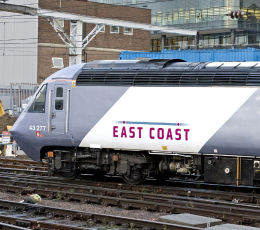 EAST COAST rail users in the UK should note that the train company is now back under Government ownership for the next two years, the present operator literally “throwing in the towel”. In charge is Eileen Holt, once of British Airways but more recently the progressive Managing Director of First Capital Connect which took over WAGN including Thameslink in April 2006. Some improvements and innovations are expected and the catering arrangements will be reviewed. East Coast Main Line Co Ltd runs services from London Kings Cross to destinations including York, Newcastle, Edinburgh, Glasgow, Aberdeen and Inverness. www.eastcoast.co.uk
EAST COAST rail users in the UK should note that the train company is now back under Government ownership for the next two years, the present operator literally “throwing in the towel”. In charge is Eileen Holt, once of British Airways but more recently the progressive Managing Director of First Capital Connect which took over WAGN including Thameslink in April 2006. Some improvements and innovations are expected and the catering arrangements will be reviewed. East Coast Main Line Co Ltd runs services from London Kings Cross to destinations including York, Newcastle, Edinburgh, Glasgow, Aberdeen and Inverness. www.eastcoast.co.uk
Farnborough Airport fails planning
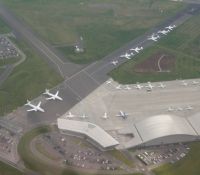 FARNBOROUGH AIRPORT, perhaps best known internationally for its biennial Airshow, but essentially very much the executive aviation gateway for west London and parts of the Home Counties, has lost a planning application to expand movements from 28k to 50k annually. Whilst the scheme was supported the planning experts asked for advice, clearly the local paper was against any change in the status quo, and a typically noisy campaign by some residents easy persuading Councillors to vote against the project. Nearby Blackbushe is likely to benefit from the situation although the Farnborough concessionaire might well decide to appeal. www.tagaviation.com
FARNBOROUGH AIRPORT, perhaps best known internationally for its biennial Airshow, but essentially very much the executive aviation gateway for west London and parts of the Home Counties, has lost a planning application to expand movements from 28k to 50k annually. Whilst the scheme was supported the planning experts asked for advice, clearly the local paper was against any change in the status quo, and a typically noisy campaign by some residents easy persuading Councillors to vote against the project. Nearby Blackbushe is likely to benefit from the situation although the Farnborough concessionaire might well decide to appeal. www.tagaviation.com
Iberia woes
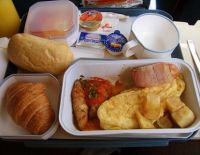 IBERIA travellers should be very wary over the next few weeks with more strike action promised by the Unions representing the Spanish airline cabin crews. The latest action last week forced the airline to cancel over 800 flights. The strikes aim to put pressure on Iberia during collective wage talks. The new dates for the industrial action are 30 November, 1-2 and 14-18 December. Within hours of the British Airways partnership (see above) being announced Iberia revealed that for the last quarter consolidated trading losses reached E16.4m versus earnings of E30.4m for the same period 2008. www.iberia.com
IBERIA travellers should be very wary over the next few weeks with more strike action promised by the Unions representing the Spanish airline cabin crews. The latest action last week forced the airline to cancel over 800 flights. The strikes aim to put pressure on Iberia during collective wage talks. The new dates for the industrial action are 30 November, 1-2 and 14-18 December. Within hours of the British Airways partnership (see above) being announced Iberia revealed that for the last quarter consolidated trading losses reached E16.4m versus earnings of E30.4m for the same period 2008. www.iberia.com
Southampton gets footbridge
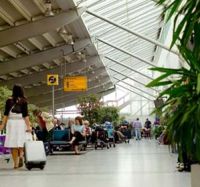 SOUTHAMPTON AIRPORT, owned by BAA, is finally to gain a footbridge over the adjoining railway line, part of a £7m redevelopment of the terminal building. AERBT has campaigned vigorously for this important introduction, the existing Southampton Parkway Station pedestrian bridge located at the wrong end of the platform, alienating passengers with heavy luggage, and those just about to miss their train. A lift is included in the project. Other improvements at the airport over the next 12 months include the introduction of the R J Mitchell restaurant, named after the man who designed the legendary Spitfire, which made its maiden flight from the then Eastleigh Aerodrome on 6 March 1936. www.southamptonairport.com
SOUTHAMPTON AIRPORT, owned by BAA, is finally to gain a footbridge over the adjoining railway line, part of a £7m redevelopment of the terminal building. AERBT has campaigned vigorously for this important introduction, the existing Southampton Parkway Station pedestrian bridge located at the wrong end of the platform, alienating passengers with heavy luggage, and those just about to miss their train. A lift is included in the project. Other improvements at the airport over the next 12 months include the introduction of the R J Mitchell restaurant, named after the man who designed the legendary Spitfire, which made its maiden flight from the then Eastleigh Aerodrome on 6 March 1936. www.southamptonairport.com
Turkey's Pegasus expands in the UK
 PEGASUS, the Turkish airline, which with 18%, is the largest shareholder in Air Berlin, is to substantially increase its services to the UK next year. Plans are to introduce Stansted to Bodrum and Dalaman; Manchester – Antalya and Dalaman; Birmingham – Antalya and Bodrum. Currently it operates a daily flight from Stansted to Sabiha Gokcen, on the Asian side of the Bosphorus at Istanbul, the same airport as easyJet. Pegasus was established in 1990 and introduced scheduled services in 2005. It currently serves 18 domestic and 16 international destinations and by 2015 will have a fleet of 45 aircraft. www.flypgs.com
PEGASUS, the Turkish airline, which with 18%, is the largest shareholder in Air Berlin, is to substantially increase its services to the UK next year. Plans are to introduce Stansted to Bodrum and Dalaman; Manchester – Antalya and Dalaman; Birmingham – Antalya and Bodrum. Currently it operates a daily flight from Stansted to Sabiha Gokcen, on the Asian side of the Bosphorus at Istanbul, the same airport as easyJet. Pegasus was established in 1990 and introduced scheduled services in 2005. It currently serves 18 domestic and 16 international destinations and by 2015 will have a fleet of 45 aircraft. www.flypgs.com
COMMENT: The British Airways / Iberia Merger
Willie Walsh has stuck his neck out this time. If the emerging British Airways/Iberia (BA/IB) consolidation goes ahead as planned by next June, he should emerge as one of the great leaders of the airline industry. If it fails it will be interesting to see if his five-year contract is extended. The excuse is already built in. BA’s pension fund, a historical liability.
Walsh has experience with dealing with Spaniards, CEO of the now failed Futura a decade back when Aer Lingus was a major shareholder, and of course with Ferrovial, his present landlord at Heathrow Terminal 5. Both relationships can be questioned.
Iberia is the latest partner in a series of abortive attempts over the years by BA to seek an international marriage with all the synergies it brings. Memories are short in the airline business but past possible relationships have included Qantas, US Airways and Swissair, plus the disastrous purchase of a couple of French airlines. In whatever business we have all read the immediate platitudes concerning takeovers or new found partnerships. But there have been very few success stories.
British Airways has in the past had a reputation for quality and service. Yes it was “The World’s Favourite Airline” and it still is always a relief to arrive at an airport somewhere around the globe and to see the Chatham flag on the tail plane. It helps to sell Britain. Any dumbing down will undoubtedly drive passengers away. By comparison Iberia is poor, its Business Class never receiving any awards, and its Economy cabin not a particularly pleasant experience. It is for Iberia to go up, not for BA to go down!
At the end of the day it is the commercial part of an airline that is the engine room. Without passengers nothing will happen.
BA dominates the North Atlantic. Love it or hate it Heathrow is the gateway for Europe, and the United States too. Madrid should do the same for the southern oceans but somehow misses out. South America is a major market for the future. But will travellers from that continent want to route via Spain? With the very long range aircraft now available it makes much more sense going direct to Heathrow (or Paris for that matter). If BA were to put efforts in that direction would an Iberia partnership be needed?
In this issue Tim Clark of Emirates makes the point talking about Africa (see WTM) but the same goes for South America. “As we started to connect these points, people started to flow in ways that we had not seen before. More fool those who do not harness what is going on.” Is BA going to throw away Brazil, Argentine and the rest in return for a few slots to the USA? Long haul flights make money, short haul, typically the feeds into Madrid, for the most part don’t.
In the past, part of the success of British Airways has been a salesman chairman, backed up by a chief executive who played a more chief operating officer role. Under the present regime this has not been the case and whilst Martin Broughton is undoubtedly a very successful businessman his part time role has been questioned. Under the new arrangement he remains, part time of course, accompanied by three other non-executives. Curiously Antonio Vazquez, Chairman and Chief Executive of Iberia, and Chairman Elect of TopCo, the official name for the merged company came from the tobacco company, Altadis, which was sold to Imperial Tobacco in 2008. Martin Broughton was Chairman of British American Tobacco until 2004.
Both BA and IB are losing money but the argument that all airlines are in dire financial peril does not stand up. Air France, Lufthansa and Korean have recently posted positive figures. They seem to have got it right.
In the main analysts have supported the new tie-up, at least at this stage. The problem with the city folk is that for the most part they do not understand the nuances of airlines and seem to take for granted the information (spin) being offered by whoever they are scrutinising. For them only a theoretical bottom line counts.
The new proposed structure is extremely complex but is not unlike AF/KLM which has been largely a success, with Paris definitely dominating at all levels. Will a British/Spanish partnership work so well? Who leads? Madrid or Waterside? Both of the commanders wish to remain in their own castles.
Neither BA or IB have been considered success stories in recent times. Sir Stelios Haji-Ioannou has described the arrangement as “two drunks that believe they can walk together by supporting each other,” whilst Sir Richard Branson has pointed out that the combined airline would have 44% of Heathrow, conveniently forgetting that Air France and Lufthansa have a higher factor of their hub airports.
The history of Britain over the last 150 years is fascinating. We lead the world with engineering, railways and ships during Victorian times. In the 20th century our cars were outstanding for many decades, and the Viscount was the exceptional aircraft of its era. British Airways (including BEA and BOAC) has been one of the finest air carriers of the last 50 years. Is it all, like everything else above, going to come to a messy (and expensive) end? Mr Walsh says the brand will remain. Mr Royce would be proud of his heritage today. Let us hope the same can be said in the decades to come of Mr Walsh’s airline.
MALCOLM GINSBERG
Editor in Chief
BAA raises funds
 BAA LTD has taken steps to ensure it has sufficient cash funds to backup its current development plans, which mainly revolve around Heathrow’s T2. The injection will consist of £200m of new equity from shareholders and £300m from BAA Airports Ltd and FGP Topco Limited, the ultimate holding company of BAA, which is jointly owned by BAA’s three controlling shareholders, Ferrovial of Spain, CDPQ of Canada and GIC Special Investments Pte Ltd, located in Singapore. BAA now effectively owns six UK airports having recently agreed to sell Gatwick airport to Global Infrastructure Partners for £1.5bn. www.baa.com
BAA LTD has taken steps to ensure it has sufficient cash funds to backup its current development plans, which mainly revolve around Heathrow’s T2. The injection will consist of £200m of new equity from shareholders and £300m from BAA Airports Ltd and FGP Topco Limited, the ultimate holding company of BAA, which is jointly owned by BAA’s three controlling shareholders, Ferrovial of Spain, CDPQ of Canada and GIC Special Investments Pte Ltd, located in Singapore. BAA now effectively owns six UK airports having recently agreed to sell Gatwick airport to Global Infrastructure Partners for £1.5bn. www.baa.com
Business Travel Show gets new name
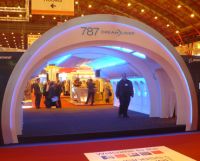 THE BUSINESS TRAVEL & MEETINGS SHOW is the new name for the Business Travel Show, which started life in the Business Design Centre Islington 16 years back, moved to Olympia and is now at Earls Court 2. The show has been reduced to two days and runs parallel with the Travel Technology Show in the same venue. For both events the dates are 9-10 February 2010. www.businesstravelshow.co.uk
THE BUSINESS TRAVEL & MEETINGS SHOW is the new name for the Business Travel Show, which started life in the Business Design Centre Islington 16 years back, moved to Olympia and is now at Earls Court 2. The show has been reduced to two days and runs parallel with the Travel Technology Show in the same venue. For both events the dates are 9-10 February 2010. www.businesstravelshow.co.uk
easyJet and Ryanair battle it out
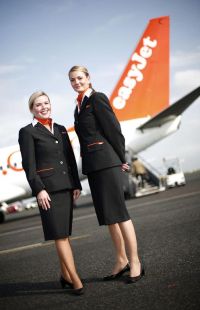 EASYJET is to increase its Basel Airbus A319 fleet from four aircraft to five next summer following Ryanair’s (FR) decision to close its base at the multi-nation airport from 2 December. Using a rare opportunity to gloat, easyJet says that this decision will more than compensate for Ryanair’s withdrawal. No new destinations have been disclosed as yet, the FR routes going being Alicante, Cagliari, Marseille, Porto, Skavsta and Stansted. www.easyjet.com
EASYJET is to increase its Basel Airbus A319 fleet from four aircraft to five next summer following Ryanair’s (FR) decision to close its base at the multi-nation airport from 2 December. Using a rare opportunity to gloat, easyJet says that this decision will more than compensate for Ryanair’s withdrawal. No new destinations have been disclosed as yet, the FR routes going being Alicante, Cagliari, Marseille, Porto, Skavsta and Stansted. www.easyjet.com
Heathrow builder moves on
 TONY DOUGLAS, the very personable former Chief Executive of Heathrow, has stepped down as Chief Operating Officer of construction company Laing O’Rourke. Where he re-appears in the future is the subject of considerable speculation. An engineer by training Mr Douglas was very much the friendly face of Heathrow Terminal 5 as it arose from a Thames Water sewerage works “on time and on budget”. He left the employ of BAA some six months before the terminal ingloriously opened. www.laingorourke.com
TONY DOUGLAS, the very personable former Chief Executive of Heathrow, has stepped down as Chief Operating Officer of construction company Laing O’Rourke. Where he re-appears in the future is the subject of considerable speculation. An engineer by training Mr Douglas was very much the friendly face of Heathrow Terminal 5 as it arose from a Thames Water sewerage works “on time and on budget”. He left the employ of BAA some six months before the terminal ingloriously opened. www.laingorourke.com
Lufthansa and the future of bmi
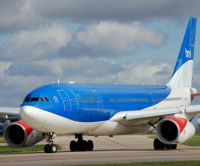 BMI has a less than assured future according to The Times. Last Wednesday (11 November) “The Thunderer” was telling readers tales of woe concerning the Lufthansa-owned airline and its future prospects. It ran more or less the same story the following day for some unexplained reason. The essence was that the new German owners would not stand by the carrier in what everyone calls “difficult times”. Clearly the value in both financial and operational terms of its 14% of Heathrow slots are not the same as two years ago, but like anything else it is always a question of supply and demand. A sharp statement by bmi said it has adequate resources to continue operational existence in the future. www.flybmi.com
BMI has a less than assured future according to The Times. Last Wednesday (11 November) “The Thunderer” was telling readers tales of woe concerning the Lufthansa-owned airline and its future prospects. It ran more or less the same story the following day for some unexplained reason. The essence was that the new German owners would not stand by the carrier in what everyone calls “difficult times”. Clearly the value in both financial and operational terms of its 14% of Heathrow slots are not the same as two years ago, but like anything else it is always a question of supply and demand. A sharp statement by bmi said it has adequate resources to continue operational existence in the future. www.flybmi.com
Stansted a worry
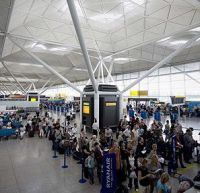 BAA has published the October passenger traffic figures for the seven airports it currently owns. Overall numbers fell by 1.4%, the best performance since June 2008. Heathrow was up 1% for the same month last year and small increases were noted for both Edinburgh and Gatwick. Stansted is still the major problem with seats on offer down by 11.7% and actual numbers falling by 10.1%. The airport is due to be sold unless an appeal is successful. Glasgow (down 9.2%), Aberdeen (down 8.3%) and Southampton (down 6.4%) also all continued to see passenger traffic fall. www.baa.com
BAA has published the October passenger traffic figures for the seven airports it currently owns. Overall numbers fell by 1.4%, the best performance since June 2008. Heathrow was up 1% for the same month last year and small increases were noted for both Edinburgh and Gatwick. Stansted is still the major problem with seats on offer down by 11.7% and actual numbers falling by 10.1%. The airport is due to be sold unless an appeal is successful. Glasgow (down 9.2%), Aberdeen (down 8.3%) and Southampton (down 6.4%) also all continued to see passenger traffic fall. www.baa.com
ON TOUR: World Travel Market
 In spite of the gloom enveloping the world’s airlines, especially the less efficient ones, World Travel Market (WTM) has successfully taken place for the 30th time, with people seriously talking about “green shoots”.
In spite of the gloom enveloping the world’s airlines, especially the less efficient ones, World Travel Market (WTM) has successfully taken place for the 30th time, with people seriously talking about “green shoots”.
Once again the DLR “played up” with a train breaking down at Bank station during the peak period of the first day (Monday) causing problems but to be fair to Transport for London they did have many more operatives around than in previous years, their technique for getting people into the carriages worthy of Tokyo. It was also apparent that most of the platform extensions along the line are now nearly complete allowing for a 50% increase in capacity, due to be implemented shortly. The new line from Canning Town to Stratford International, the 2012 Olympic site, is clearly nearly complete.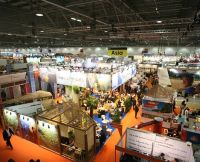 In truth WTM is now more of a leisure travel fair than a “not to be missed” business travel opportunity. The halls were full with both stands and people but for the most part the major airlines gave it a miss. Some 40 carriers were listed but rather than exhibiting on their own they mostly formed part of a National stand, typified by Kingfisher, part of the Indian Tourist Board consortium. On display was a Formula One car and beer was in full supply too!
In truth WTM is now more of a leisure travel fair than a “not to be missed” business travel opportunity. The halls were full with both stands and people but for the most part the major airlines gave it a miss. Some 40 carriers were listed but rather than exhibiting on their own they mostly formed part of a National stand, typified by Kingfisher, part of the Indian Tourist Board consortium. On display was a Formula One car and beer was in full supply too!
London Mayor Boris Johnson opened WTN by highlighting how tourism and travel can bring people together in shared appreciation and understanding. In reference to the Olympic Games, Johnson stated that he was optimistic about the impact of the Games and wants to use the £9.3bn investment to boost bits of London which have been neglected for ages. He also brought attention to the benefits of tourism, saying that it would not be short term but will benefit the city for years to come, with the enormous infrastructure project being the biggest change to London’s infrastructure in over 70 years.
Continental’s new BusinessFirst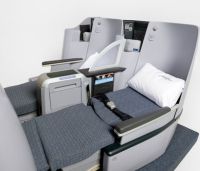 By far the most important airline event was the unveiling of Continental’s BusinessFirst flat seat module with Senior Vice President (Sales) Dave Hilfman coming over specially from Houston for the event. It is a very well thought out unit, perhaps not as extravagant as some of the offerings from the Middle East carriers, but clearly very efficient in offering all that is needed on long haul overnight flights. The seats could well be seen on the airline’s regional 757 routes out of Newark to Birmingham, Bristol, Manchester, Edinburgh and Glasgow before it is fully implemented at Heathrow and the 777.
By far the most important airline event was the unveiling of Continental’s BusinessFirst flat seat module with Senior Vice President (Sales) Dave Hilfman coming over specially from Houston for the event. It is a very well thought out unit, perhaps not as extravagant as some of the offerings from the Middle East carriers, but clearly very efficient in offering all that is needed on long haul overnight flights. The seats could well be seen on the airline’s regional 757 routes out of Newark to Birmingham, Bristol, Manchester, Edinburgh and Glasgow before it is fully implemented at Heathrow and the 777.
Continental emphasised that the very recent joining of Star Alliance was already having an effect with the airline probably announcing a fourth Heathrow – Newark frequency for next summer. The move from Gatwick to Heathrow had been a big success.
With Emirates and Etihad again with massive stands Oman Air’s more modest offering showed a very well thought out Business Class seat, one which many carriers would have been proud of in First.
Parallel to the show is always a whole series of travel related seminars held in the labyrinth of rooms that is all part of the Excel complex.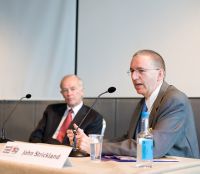 The air travel component was headed by John Strickland, now a consultant but whose CV includes British Caledonian, British Airways, KLM uk and Buzz. John lead discussions with Emirsyah Satar, President and CEO of Garuda, who are now back into Europe, and chaired an environmental panel which included Richard Vaughan, Divisional Senior Vice President, Commercial Operations Worldwide, Emirates; Dr Andy Jefferson, Head of Environment, BAA Stansted and Dr Callum Thomas, Manchester University.
The air travel component was headed by John Strickland, now a consultant but whose CV includes British Caledonian, British Airways, KLM uk and Buzz. John lead discussions with Emirsyah Satar, President and CEO of Garuda, who are now back into Europe, and chaired an environmental panel which included Richard Vaughan, Divisional Senior Vice President, Commercial Operations Worldwide, Emirates; Dr Andy Jefferson, Head of Environment, BAA Stansted and Dr Callum Thomas, Manchester University.
Tim Clark and Emirates
However the star of the week was Tim Clark, a resident of Dubai for 24 years and President of Emirates Airline. His theme was that air carriers must develop new routes in emerging economies if they want to survive. “Africa is an enormously powerful and potentially very strong continent. The Chinese influence in Africa is more obvious,” he explained to a packed audience. “As we started to connect these points, people started to flow in ways that we had not seen before. More fool those who do not harness what is going on, including the European carriers.”
Clark warned that those who were “disingenuous” about Dubai’s growth – particularly the UK press – “do so at their own peril.”
“It is an open economy and suffered in the recession. We have taken stock and slowed down but watch this space very carefully,” he explained. As well as its key geographical location and hub operation, Emirates’ results have been boosted by a programme of cost cuts and lower fuel prices. Clark said Emirates will close the financial year significantly up on previous profit forecasts, thanks to the quality of its brand, a fall in the oil price and favourable exchange rates.
Clark said Emirates will close the financial year significantly up on previous profit forecasts, thanks to the quality of its brand, a fall in the oil price and favourable exchange rates.
Seat factors remain “in the 80% region” albeit with a lower yield per seat and the carrier has taken 16% off its unit costs, thanks to a recruitment freeze and efficiency drive.
He also questioned the value of airline alliances and warned that the recession should not be a “smokescreen” that allows consolidation and anti-trust immunity to be granted to rival airlines.
Another welcome guest at a session was Emirsyah Satar, President and CEO, of Garuda Indonesia, who seems to be well on the way towards turning around a once “basket case” into a top class airline. Already planning to re-introduce a Jakarta – Amsterdam service he spoke of safety approvals restored, and fleet renewals with Airbus A330, Boeing 737-800 and 777. He wants to improve the product and says with the Indonesian economy looking up all the targets should be achieved. As he pointed out Indonesia has a population 240m making it it is the world's fourth most populous country.
In another session Caroline Bremner, Head of Travel and Tourism Research at Euromonitor International, said Low Cost Carriers (LCC) accounted for 22% of the market in 2008 but that would rise to 25.4% in 2010. Strickland pointed out that with certain European markets the LCC penetration was even higher, reaching 35-40%, although he pointed out that in the case of BA it was boosting load factors by taking out capacity from its fleet.
“Legacy carriers are seeing a structural shift because of the loss of their most profitable passengers paying premium fares – these have declined about 14-15%,” he said. WTM took place prior to the BA/Iberia announcement and therefore, whilst noted at the time, the lack of appearance by Willie Walsh can be forgiven. Perhaps not so BA itself although very senior individuals from the airline were noted looking around. Walsh did appear in video recorded during the what was termed “The Global Economic Forum” noting “The turmoil in the financial services had a direct impact on numbers in our premium cabins.” Hardly mind boggling news. The BA vote by cabin crew today (16 November) over strike action regarding pay and conditions was a topic much discussed. Would passengers look elsewhere for their pre-Christmas travel. www.wtmlondon.com
WTM took place prior to the BA/Iberia announcement and therefore, whilst noted at the time, the lack of appearance by Willie Walsh can be forgiven. Perhaps not so BA itself although very senior individuals from the airline were noted looking around. Walsh did appear in video recorded during the what was termed “The Global Economic Forum” noting “The turmoil in the financial services had a direct impact on numbers in our premium cabins.” Hardly mind boggling news. The BA vote by cabin crew today (16 November) over strike action regarding pay and conditions was a topic much discussed. Would passengers look elsewhere for their pre-Christmas travel. www.wtmlondon.com
Air France unveils brand new European service
 AIR FRANCE has been busy. What with the introduction of the A380 and the upgrading of long haul Premium Economy Class it is also introducing new services on its medium haul from April next year. The essentials of the current Air France service will remain however with the airline continuing to offer two clearly separate cabins, Voyageur and Premium. Air France makes it very clear that its offerings will not be that of a low cost carrier, unlike Iberia whose plan is to challenge that market. The Voyageur product includes free hold baggage up to 23 kg, choice of seat at check-in, wide choice of newspapers, catering adapted to the flight time. In the Premium cabin you can sit 2+2 or 3+3 and pay accordingly. The offering here is tailored to the requirements of business travellers seeking more flexibility and enhanced service. www.airfrance.com
AIR FRANCE has been busy. What with the introduction of the A380 and the upgrading of long haul Premium Economy Class it is also introducing new services on its medium haul from April next year. The essentials of the current Air France service will remain however with the airline continuing to offer two clearly separate cabins, Voyageur and Premium. Air France makes it very clear that its offerings will not be that of a low cost carrier, unlike Iberia whose plan is to challenge that market. The Voyageur product includes free hold baggage up to 23 kg, choice of seat at check-in, wide choice of newspapers, catering adapted to the flight time. In the Premium cabin you can sit 2+2 or 3+3 and pay accordingly. The offering here is tailored to the requirements of business travellers seeking more flexibility and enhanced service. www.airfrance.com
bmibaby at Manchester
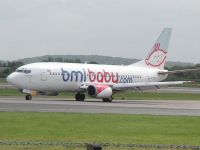 BMIBABY has now confirmed the dropping of the Manchester routes to Alicante and Malaga although for next summer it is introducing a twice weekly service to Lourdes. As things stand bmibaby will finish up with 14 routes out of Manchester for the peak period of 2010. Also see Lufthansa and the future of bmi
BMIBABY has now confirmed the dropping of the Manchester routes to Alicante and Malaga although for next summer it is introducing a twice weekly service to Lourdes. As things stand bmibaby will finish up with 14 routes out of Manchester for the peak period of 2010. Also see Lufthansa and the future of bmi
Dubai Airshow
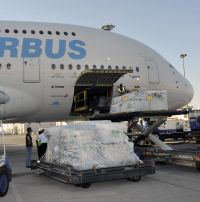 DUBAI’S AIRSHOW got of to a well meaning start yesterday (Sunday 15 November) with the arrival of eight tonnes of humanitarian aid. The delivery, facilitated by the Airbus Corporate Foundation, a non-commercial arm of the leading aircraft manufacturer, and its partners, will boost crucial stocks at Action Against Hunger’s hub in the emirate – strategically located to serve a global effort. Founded in France in 1979, Action Against Hunger is recognised as one of the most important humanitarian organisations combating hunger and malnutrition worldwide. It is an issue that affects approximately one billion people across the globe, with most lacking access to clean water leading to disease and malnutrition, and remains the largest single contributor to child mortality. The show runs until Thursday 19 November. www.dubaiairshow.aero
DUBAI’S AIRSHOW got of to a well meaning start yesterday (Sunday 15 November) with the arrival of eight tonnes of humanitarian aid. The delivery, facilitated by the Airbus Corporate Foundation, a non-commercial arm of the leading aircraft manufacturer, and its partners, will boost crucial stocks at Action Against Hunger’s hub in the emirate – strategically located to serve a global effort. Founded in France in 1979, Action Against Hunger is recognised as one of the most important humanitarian organisations combating hunger and malnutrition worldwide. It is an issue that affects approximately one billion people across the globe, with most lacking access to clean water leading to disease and malnutrition, and remains the largest single contributor to child mortality. The show runs until Thursday 19 November. www.dubaiairshow.aero
Emirates and the A380
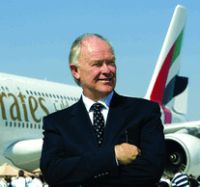 EMIRATES President Tim Clark was a surprise and welcome visitor to World Travel Market and spoke at a seminar presented by John Strickland. On the subject of the Airbus A380 he said that deliveries were five months behind schedule and that the return of the aircraft to the Dubai – New York route was not likely until next autumn. He emphasised that the future for limited capacity airports, such as Heathrow, was larger aircraft, and that the A380 was the only aeroplane available. www.emirates.com
EMIRATES President Tim Clark was a surprise and welcome visitor to World Travel Market and spoke at a seminar presented by John Strickland. On the subject of the Airbus A380 he said that deliveries were five months behind schedule and that the return of the aircraft to the Dubai – New York route was not likely until next autumn. He emphasised that the future for limited capacity airports, such as Heathrow, was larger aircraft, and that the A380 was the only aeroplane available. www.emirates.com
Hogg Robinson and the EU
 HOGG ROBINSON, the travel management company (TMC), is at the forefront of a pan-EU campaign, supported by American Express, Carlson Wagonlit and others, to influence the interpretation of the new EU regulations coming into effect 1 January 2010, insofar as they relate to the VAT treatment of hotel booking fees. The EU is split as to whether the VAT rules apply to the country in which the TMC's client is located (Article 44) or the country in which the hotel is located (Article 47). The former position is essentially where TMC's are today and is consistent with the VAT treatment of normal business expenditure. A shift to Article 47 would mean the TMC's fees suddenly become subject to multi-jurisdictional VAT regimes and result in complex and costly administration for both the TMC's and their clients. What Hogg Robinson and the others are saying is that urgent clarification is needed and that deeming TMC hotel booking fees as taxable under Article 44 is clearly the only workable option going forward for everyone. Read a more detailed report
HOGG ROBINSON, the travel management company (TMC), is at the forefront of a pan-EU campaign, supported by American Express, Carlson Wagonlit and others, to influence the interpretation of the new EU regulations coming into effect 1 January 2010, insofar as they relate to the VAT treatment of hotel booking fees. The EU is split as to whether the VAT rules apply to the country in which the TMC's client is located (Article 44) or the country in which the hotel is located (Article 47). The former position is essentially where TMC's are today and is consistent with the VAT treatment of normal business expenditure. A shift to Article 47 would mean the TMC's fees suddenly become subject to multi-jurisdictional VAT regimes and result in complex and costly administration for both the TMC's and their clients. What Hogg Robinson and the others are saying is that urgent clarification is needed and that deeming TMC hotel booking fees as taxable under Article 44 is clearly the only workable option going forward for everyone. Read a more detailed report
Marriott launches new brand
 MARRIOTT INTERNATIONAL has launched “The Autograph Collection,” a new brand within the company’s global portfolio, describing the product as “hotels with distinctive personalities in major cities and desired destinations worldwide.” It also uses the term “upper upscale and luxury” in a statement. Initially Marriott plans to unveil about 25 hotels worldwide in 2010. Don Semmler, Executive Vice President of Brand Management for Marriott International, said: ‘The Autograph Collection will take the innovative approach of grouping these iconic hotels according to the unique experience that guests are seeking, whether it’s a resort, historic hotel, boutique arts, or urban edge hotel in a dynamic gateway city.” www.marriott.com
MARRIOTT INTERNATIONAL has launched “The Autograph Collection,” a new brand within the company’s global portfolio, describing the product as “hotels with distinctive personalities in major cities and desired destinations worldwide.” It also uses the term “upper upscale and luxury” in a statement. Initially Marriott plans to unveil about 25 hotels worldwide in 2010. Don Semmler, Executive Vice President of Brand Management for Marriott International, said: ‘The Autograph Collection will take the innovative approach of grouping these iconic hotels according to the unique experience that guests are seeking, whether it’s a resort, historic hotel, boutique arts, or urban edge hotel in a dynamic gateway city.” www.marriott.com
THAI President visits London
 THAI’S new President Piyasvasti Amranand visited London last week, part of a road show with international investors laying out his vision for the airline. Once one of the most aggressive airlines in South East Asia in terms of marketing and product quality, Thai still continues with a high standard of operation but has suffered from airport problems at its main hub and also political interference. Laying out his vision for THAI, which he called “a national treasure that we must help protect”, Mr. Piyasvasti said consideration of a recapitalization will be dependent on planned investments, operating results and other financing options. www.thaiair.com
THAI’S new President Piyasvasti Amranand visited London last week, part of a road show with international investors laying out his vision for the airline. Once one of the most aggressive airlines in South East Asia in terms of marketing and product quality, Thai still continues with a high standard of operation but has suffered from airport problems at its main hub and also political interference. Laying out his vision for THAI, which he called “a national treasure that we must help protect”, Mr. Piyasvasti said consideration of a recapitalization will be dependent on planned investments, operating results and other financing options. www.thaiair.com



